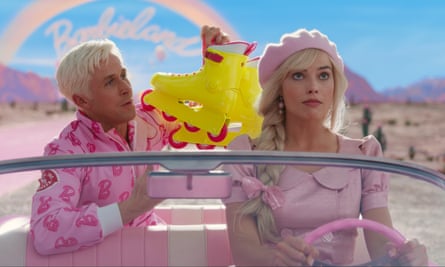Barbie’s muddled feminist fantasy still bows to the patriarchy | Barbie
It’s a shame about the weather but, in the eyes of many, the summer of 2023 is at least furnishing a triumph of feminism, and it’s been cinema’s privilege to host it. Supposedly, Greta Gerwig’s fantasy comedy Barbie is ushering womankind on to the true path to sisterly empowerment. Really?
It sounds plausible, at least at first. “She’s everything. He’s just Ken,” reads the film’s tagline. Gerwig proclaims Barbie to be “most certainly a feminist film”, and it has frightened some male pundits out of their wits. Toby Young has accused it of “unapologetic misandry”, while the Critical Drinker considered it “114 minutes of spiteful, bitter, mean-spirited, borderline unhinged hatred of men”. And, briefly summarised, the film does indeed sound like an almost ridiculously over-the-top feminist homily.
Barbieland, the fantasy world in which females rule the roost, is a paradise. Its womenfolk are wonderfully nice; its menfolk are acceptable only because they’re subjugated. In the real world, where men are on top, they’re stupid, incapable and offensive. When masculinity penetrates Barbieland and threatens to ruin it, women use their superior intelligence to re-establish their hegemony, before helping their grateful menfolk to relinquish their toxicity. Yet somehow the film’s actual import turns out to be the opposite of its apparent message.
It has been widely remarked that Ryan Gosling as Ken, Barbie’s boyfriend, steals the show from Margot Robbie as Barbie. No mean feat, since Ken is there to demonstrate that masculinity is foolish, yucky and reprehensible. Somehow, however, Gosling’s performance countermands his brief. A supposed parody of chauvinist iniquity comes across instead as a winsome display of male charm. Masculinity becomes more beguiling than abhorrent, and Ken’s eventual repentance therefore almost ironic.
Since men are to be portrayed as silly, the patriarchy has to be incompetent. When corporate America tries to put Barbie back in her box, it is defeated by its own inanity. Ken and his peers’ regrettable competitiveness and aggression prove self-destructive, and make them easy meat for the Barbieland counter-revolution. But this vulnerability drains the supposed oppressors of any degree of threat. The male ascendency, already sneakily attractive, turns out to be harmless as well.
Woman’s lot, on the other hand, remains as knottily problematic as ever, and Robbie’s challenge is consequentially an uphill one. Unlike Ken, Barbie is to be permitted no real flaws which might round out her character but undermine her gynocratic sanctity. Instead, she’s left to embrace a vision of the female mission that’s mired in banality and confusion.
At the film’s climax, America Ferrera’s Gloria, the LA mom whose angst has catapulted Barbie into the real world, presents her with a stirring litany of womanly woes. Its gist is that as long as the dudes are in charge, dames are doomed whatever they do. Gosh, it’s hard to be a woman. Reportedly, Ferrera’s rendition left everyone on the set in tears, even the men. Yet this speech sits uncomfortably alongside Barbie’s official slogan: “You can be anything.” Is aspiration a female fundamental, or an unfair imposition?
Whatever. Gloria’s outpouring is all it takes to galvanise the gals into vanquishing the guys. Awkward contradictions in the gameplan are casually sidestepped. The film virtually acknowledges this with a knowing but fatal joke. Helen Mirren’s voiceover dares to point out the mismatch between celebrating the female right to eschew perfection and choosing Robbie as a leading lady. Quite.
Women are counselled to discard illusions and confront real life, but what this might mean in practice remains unclear. Barbie consults a mystic oracle in the shape of the ghost of Ruth Handler, the Barbie doll’s inventor, but all she learns is that she’s allowed to be real. This turns out to mean she can visit a gynaecologist, but that’s pretty much it.
after newsletter promotion
Where a real path forward is actually discernible, it turns out to be disheartening. Male domination is overcome not by open engagement but by feminine wiles, an approach that seems neither progressive nor likely to be especially productive. Rather, it fosters the fear that things won’t be changing any time soon. Men are expected to abandon masculinity once women show them its folly, yet the film has inadvertently advertised its apparently irreversible appeal.

So, what are those bevies of pink-bedecked filmgoing females supposed to make of all this? They will see seductive but dubious stereotypes embellished rather than subverted. Muddled messaging may dispel rather than stimulate any impulse to crusade. What might therefore leave the most residual impact is Sarah Greenwood’s luscious production design. A clear call to action does in the end emerge: go forth and buy the products of the film’s sponsor, Mattel, and its galaxy of commercial partners.
If Barbie constitutes a triumph, it’s a triumph not of feminism but of the patriarchy’s so far most unassailable scion – capitalism. Women have been spending millions to watch a giant advertisement more likely to bewilder than inspire them. And now they’re spending millions more on the merch. Mattel’s (male) chairman and CEO, Ynon Kreiz, has plenty of cause to be pleased. But feminists? Perhaps not so much.
It’s a shame about the weather but, in the eyes of many, the summer of 2023 is at least furnishing a triumph of feminism, and it’s been cinema’s privilege to host it. Supposedly, Greta Gerwig’s fantasy comedy Barbie is ushering womankind on to the true path to sisterly empowerment. Really?
It sounds plausible, at least at first. “She’s everything. He’s just Ken,” reads the film’s tagline. Gerwig proclaims Barbie to be “most certainly a feminist film”, and it has frightened some male pundits out of their wits. Toby Young has accused it of “unapologetic misandry”, while the Critical Drinker considered it “114 minutes of spiteful, bitter, mean-spirited, borderline unhinged hatred of men”. And, briefly summarised, the film does indeed sound like an almost ridiculously over-the-top feminist homily.
Barbieland, the fantasy world in which females rule the roost, is a paradise. Its womenfolk are wonderfully nice; its menfolk are acceptable only because they’re subjugated. In the real world, where men are on top, they’re stupid, incapable and offensive. When masculinity penetrates Barbieland and threatens to ruin it, women use their superior intelligence to re-establish their hegemony, before helping their grateful menfolk to relinquish their toxicity. Yet somehow the film’s actual import turns out to be the opposite of its apparent message.
It has been widely remarked that Ryan Gosling as Ken, Barbie’s boyfriend, steals the show from Margot Robbie as Barbie. No mean feat, since Ken is there to demonstrate that masculinity is foolish, yucky and reprehensible. Somehow, however, Gosling’s performance countermands his brief. A supposed parody of chauvinist iniquity comes across instead as a winsome display of male charm. Masculinity becomes more beguiling than abhorrent, and Ken’s eventual repentance therefore almost ironic.
Since men are to be portrayed as silly, the patriarchy has to be incompetent. When corporate America tries to put Barbie back in her box, it is defeated by its own inanity. Ken and his peers’ regrettable competitiveness and aggression prove self-destructive, and make them easy meat for the Barbieland counter-revolution. But this vulnerability drains the supposed oppressors of any degree of threat. The male ascendency, already sneakily attractive, turns out to be harmless as well.
Woman’s lot, on the other hand, remains as knottily problematic as ever, and Robbie’s challenge is consequentially an uphill one. Unlike Ken, Barbie is to be permitted no real flaws which might round out her character but undermine her gynocratic sanctity. Instead, she’s left to embrace a vision of the female mission that’s mired in banality and confusion.

At the film’s climax, America Ferrera’s Gloria, the LA mom whose angst has catapulted Barbie into the real world, presents her with a stirring litany of womanly woes. Its gist is that as long as the dudes are in charge, dames are doomed whatever they do. Gosh, it’s hard to be a woman. Reportedly, Ferrera’s rendition left everyone on the set in tears, even the men. Yet this speech sits uncomfortably alongside Barbie’s official slogan: “You can be anything.” Is aspiration a female fundamental, or an unfair imposition?
Whatever. Gloria’s outpouring is all it takes to galvanise the gals into vanquishing the guys. Awkward contradictions in the gameplan are casually sidestepped. The film virtually acknowledges this with a knowing but fatal joke. Helen Mirren’s voiceover dares to point out the mismatch between celebrating the female right to eschew perfection and choosing Robbie as a leading lady. Quite.
Women are counselled to discard illusions and confront real life, but what this might mean in practice remains unclear. Barbie consults a mystic oracle in the shape of the ghost of Ruth Handler, the Barbie doll’s inventor, but all she learns is that she’s allowed to be real. This turns out to mean she can visit a gynaecologist, but that’s pretty much it.
after newsletter promotion
Where a real path forward is actually discernible, it turns out to be disheartening. Male domination is overcome not by open engagement but by feminine wiles, an approach that seems neither progressive nor likely to be especially productive. Rather, it fosters the fear that things won’t be changing any time soon. Men are expected to abandon masculinity once women show them its folly, yet the film has inadvertently advertised its apparently irreversible appeal.

So, what are those bevies of pink-bedecked filmgoing females supposed to make of all this? They will see seductive but dubious stereotypes embellished rather than subverted. Muddled messaging may dispel rather than stimulate any impulse to crusade. What might therefore leave the most residual impact is Sarah Greenwood’s luscious production design. A clear call to action does in the end emerge: go forth and buy the products of the film’s sponsor, Mattel, and its galaxy of commercial partners.
If Barbie constitutes a triumph, it’s a triumph not of feminism but of the patriarchy’s so far most unassailable scion – capitalism. Women have been spending millions to watch a giant advertisement more likely to bewilder than inspire them. And now they’re spending millions more on the merch. Mattel’s (male) chairman and CEO, Ynon Kreiz, has plenty of cause to be pleased. But feminists? Perhaps not so much.
